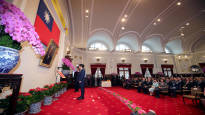The relations between Taiwan and China have been strained in recent years.
The island nation of Taiwan next to China got a new president over the weekend.
Lai Ching-te or William Lai took the oath of office on Monday in the capital Taipei, reports for example BBC.
During his speech, Lai also sent greetings to China.
– Stop threatening the island and accept that we are a democracy, Taiwan’s new president said.
The president called on the Chinese administration to stop pursuing a hostile policy towards Taiwan and instead of confrontation, start a dialogue with the country.
The new president also said that Taiwan is not going to bend to China’s manipulation, no matter how much China tries to annex it to mainland China.
The Chinese Foreign Ministry commented on the speech of the President of Taiwan as soon as Lai Ching-te had taken office.
China’s foreign ministry said Monday that Taiwan’s independence is a “dead end” and doomed to failure.
According to China, Taiwan’s new president sent dangerous messages. According to the Ministry of Foreign Affairs, Lai Ching-te undermines peace and stability in the region.
US Secretary of State Antony Blinken congratulated Taiwan’s president on Sunday, even though the United States has not formally recognized Taiwan as an independent nation.
The Taiwan Democratic Party defeated the pro-China party
Lai, representative of the Democratic Progressive Party, won Taiwan’s presidential election by a clear margin in January.
Lai got 40 percent of voices and led his number one opponent, the pro-Chinese Kuomintang party Hou Yu-iha already at the beginning of the vote count by eight percentage points.
In the end, the representative of the Kuomintang received 33.5 percent of the votes cast. The representative of the Taiwan People’s Party who placed third in the election Ko Wen-je received 26.5 percent support.
In his campaign, Lai talked about employment and strengthening Taiwan’s defense forces.
Taiwan’s government has already raised its defense budget to 2.6 percent of gross domestic product. The conscription period for young men has been extended from four months to a year.
China considers Taiwan a rebel province
The election result has not pleased China.
Even before the elections, Lai was called a separatist in the Chinese state media, whose election would further weaken the relations between China and Taiwan.
In December, during the election, the data cables of Matsu, which is located near the coast of China and belongs to Taiwan, were unexpectedly damaged.
It was later revealed that two Chinese vessels happened to be moving relatively precisely above the submarine cables.
China has not admitted to being behind the submarine cable damage.
However, in recent years, China has repeatedly harassed Taiwan at sea and sent dozens of military planes close to Taiwan’s airspace.
According to China, it was a military exercise.
China has resolutely increased its control over the South China Sea, where it is building bases on atolls and islets under its control, despite objections.
The Chinese armed forces make no secret of the fact that they are preparing to attack Taiwan.
Throughout the communist regime, the People’s Republic of China, i.e. Mainland China, has kept it clear that Taiwan is a rebel province of China, which must be re-integrated into China.
Also listen to:
Sources: AFP, Reuters
